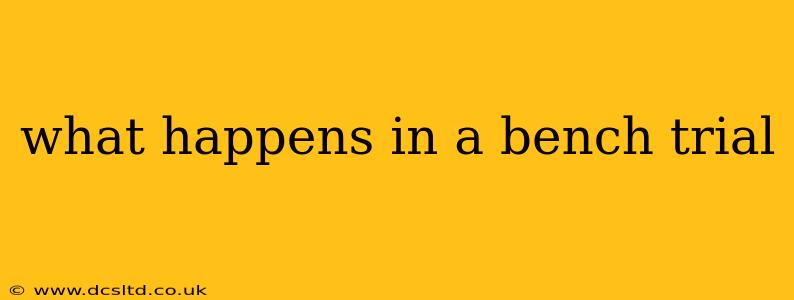A bench trial is a trial where the judge, rather than a jury, acts as the fact-finder. This means the judge decides the facts of the case and applies the law to those facts to reach a verdict. While jury trials are more common in many jurisdictions, bench trials offer a different approach with unique characteristics. This comprehensive guide will explain what happens in a bench trial, answering common questions and offering insights into this legal process.
What is the Difference Between a Bench Trial and a Jury Trial?
The core difference lies in who decides the case's outcome. In a jury trial, a group of citizens hears evidence and delivers a verdict. In a bench trial, the judge alone assumes this responsibility. This difference impacts the overall trial dynamics and the level of formality. Bench trials often proceed at a quicker pace due to the absence of jury selection and deliberation.
What Happens During a Bench Trial? A Step-by-Step Look
A bench trial follows a structured process similar to a jury trial, though with some key distinctions:
-
Opening Statements: Both sides present their opening statements, outlining their case's anticipated evidence and arguments. The judge listens attentively, focusing on the legal strategy and factual claims.
-
Presentation of Evidence: The plaintiff (or prosecution) presents their case first, introducing witnesses and physical evidence. The defense then has the opportunity to cross-examine witnesses and present their own evidence. This process is similar to a jury trial, emphasizing the presentation of admissible and relevant evidence.
-
Closing Arguments: After all the evidence is presented, both sides deliver closing arguments, summarizing their case and urging the judge to rule in their favor. In a bench trial, the legal arguments and interpretations of evidence become crucial, as the judge is responsible for both assessing the facts and applying the law.
-
Judge's Decision: The judge renders a verdict after considering the evidence and arguments. This decision is binding and carries the same legal weight as a jury verdict. Unlike a jury, the judge typically provides a detailed explanation of the reasoning behind their decision, clarifying their legal interpretation and factual findings.
How Does a Judge Decide in a Bench Trial?
The judge meticulously evaluates the presented evidence, considering its credibility, relevance, and weight. They assess witness testimony, examining body language, consistency, and potential biases. Physical evidence is analyzed for authenticity and probative value. The judge also considers the applicable law, interpreting statutes and precedents to guide their decision. Ultimately, the judge weighs all factors to arrive at a just and legally sound verdict.
Who Chooses a Bench Trial?
The choice between a bench trial and a jury trial often rests on the defendant's preference. However, the prosecution might also request a bench trial in certain circumstances. Factors influencing this decision include:
- Complexity of the case: A complex case might be better suited for a judge's expertise in legal interpretation.
- Sensitivity of the evidence: In cases with potentially sensitive or prejudicial evidence, a judge might be considered more impartial than a jury.
- Expected jury bias: If either side believes there's a risk of jury bias, a bench trial might provide a more neutral setting.
What are the Advantages and Disadvantages of a Bench Trial?
Advantages:
- Efficiency: Bench trials often proceed more quickly than jury trials due to the absence of jury selection and deliberations.
- Expertise: Judges possess significant legal knowledge and experience, potentially leading to a more informed decision.
- Impartiality: While not always guaranteed, judges are trained to be impartial and to base their decisions solely on the evidence and the law.
Disadvantages:
- Lack of public participation: The absence of a jury removes the element of community involvement and citizen oversight.
- Potential for bias: Despite training, judges are human and may possess unconscious biases that influence their decisions, although systems are in place to mitigate this.
- Limited appeal options: Appeals are sometimes more limited in bench trials, focusing more on legal errors than factual disputes.
Can I Request a Bench Trial?
The rules governing the selection of a bench trial vary depending on the jurisdiction and the type of case. Generally, the defendant has the right to waive their right to a jury trial and opt for a bench trial. It's essential to consult with an attorney to understand your rights and options in your specific legal situation.
This comprehensive overview should provide a clearer understanding of bench trials and their intricacies. Remember, legal processes can be complex, and consulting with a legal professional is always advisable for specific guidance related to your case.
